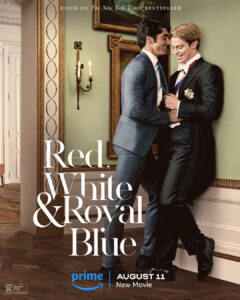Red, White & Royal Blue Celebrates Queer Love

Queer media tends to be deeply humanistic, for reasons that will not surprise queer humanists, and Red, White & Royal Blue (available for streaming on Amazon Prime Video) is no exception to such tendencies. It is, pleasantly enough, an exception to many of the more grim tendencies and pointless tropes that plague queer films and is one of the most colorful, high energy, high stakes, and joyful queer films this young reviewer has ever seen.
Bucking common enough trends in queer films, such as the starving artist, this movie’s central couple is composed of two wealthy, high-status queer individuals: Alex Claremont-Diaz (the son of American president Ellen Claremont and Hispanic congressman Oscar Diaz) played by Taylor Zakhar Perez and the British Prince Henry played by Nicholas Galitzine. The film begins with Alex heading to the United Kingdom to escort the granddaughter of the vice-president to the wedding of the grandson of the King of England, the crown prince and next in line for the throne. At the wedding, typical romantic comedy shenanigans occur and we learn that Prince Henry and first-son Alex have already met and are not fond of each other.
The events of the film play out primarily from first son Alex’s point-of-view. Alex desires to help his family stay in power, and to get his mother, President Claremont (played by the ever-iconic Uma Thurman) to take his political advice and stratagems seriously. At the same time we see Alex navigate school, interact with a prominent member of the press, attend high-profile social events, and eventually begin to befriend and then fall for Prince Henry. The film is remarkably modern, showcasing the potential of long-distance relationships, as well as the pitfalls of romantic relationships involving one or more prominent public-facing figures, particularly ones whose positions are steeped in tradition and rigid social rules.
While Taylor and Nicholas give immensely compelling performances they are far from the only actors given chances to shine. Both the first son and the prince are surrounded by loving, though complex, families and retinues of friends and allies who seek to protect them in their own ways. Uma Thurman and Clifton Collins, Jr. (who portrays Congressman Oscar Diaz) both share loving moments with Taylor. Plus viewers get to hear Uma Thurman speak in a southern accent, something many fans of the dynamic actress might not have gotten to do before. Conversely, Ellie Bamber, who plays Princess Beatrice, the younger sister of Prince Henry, gets to share several scenes with Nicholas and provides much needed warmth to a type of role that is all-too-often depicted with stoic nobility, helping non-British viewers unfamiliar with the dynamics of the British royal family find grounding realism to an intensely complex family dynamic.
The film’s earnestly humanistic undertones are ever-present even in ways that go beyond the inherent humanism of queer romances that do not end in tragedy or heartbreak. Both the film’s stars and the supporting cast are inclusive, with both Alex and Henry having family (in Alex’s case) and friends (in Henry’s case) who reflect the diversity of the United States and the United Kingdom.
At the same time, the film’s attempts at realism and conflict come with depictions of the prince’s concerns about his non-traditional romance and relationship with the United States’ first son, which eventually lead to the prince making an unsurprising and, given the nature of his career and family’s history, ultimately understandable decision. This leads to the beginning of the third act of the film, which flows at a break-neck pace and culminates in, as far as Alex’s story arc goes, both happy reconciliation and a powerful speech that reflects both the joy and nuances of queer identity, of coming out, and the complexities of balancing one’s personal life and their public identity. Meanwhile Henry’s plot comes to a dramatic confrontation that leads to a stunning and moving rejection of stifling tradition and harmful expectations.
This film is a moving romantic comedy, one that is beautifully filmed and showcases unironic, unconditional queer joy, both romantically and in general. There is humanism inherent in the very concept of queer people being allowed to live fully fulfilling public lives wherein they get to show love for their partners and not be regarded as less deserving of public recognition or deal with the other pitfalls that accompany being simultaneously queer and in a position of high status. This film shows that wonderfully. This is a powerful movie and it is the hope of this queer, humanistic movie fan that more films follow in its footsteps.
